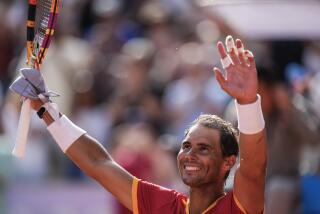A Band Plays the Oldies for Borg
Picture, if you can, Babe Ruth retiring from baseball while he was still a pitcher.
How about imagining Jack Nicklaus quitting after winning his second Masters or fourth major?
What if Jack Dempsey hung them up after the Jess Willard fight? What if Knute Rockne went into business after his first national championship?
Well, the exact equivalent happened in 1982 when Bjorn Borg, who was to tennis what any of the above were to their sports, suddenly and shockingly put away his rackets and headbands and announced he was through with the game. He was 26.
At age 26, Ruth had just turned outfielder and had only 103 of the 714 home runs he was to hit in his career. At 26, Pete Rose had only 723 of his 4,256 hits. At 26, Rocky Marciano had not yet had a main event. When he turned 26, Nicklaus had not yet won a British Open.
Supposing the word burnout had crept into the language a generation or two earlier? That was a day and time when you signed on for the duration. You used to have to cut the uniform off a player. Joe Louis was fighting young bulls from Brockton when he had nothing left but his powerful punch. It was like having a railroad gun--and no railroad. Mickey Mantle played till he couldnât get around on the fastball. Dempsey and Benny Leonard made comebacks when they needed glasses. People worked in factories 55 years. Burnout wasnât a word anyone was familiar with. Burnout was a cop out.
Don Budge and Bill Tilden played into their dotage. Even in the amateur era, when the payoff was a silver cup and a free meal, tennists persevered.
Which is why the sports world was stunned when Borg announced he was defaulting from tennis.
How inconceivable was it? Well, consider Borg is four years younger than Jimmy Connors. He is only two years older than John McEnroe, who still dreams of winning Wimbledon or the U.S. Open.
Borg had just completed the most remarkable run in modern Wimbledon history--five consecutive victories in that tournament. You had to go back to the turn of the century when tennis was the province only of the aristocracy to find a comparable performance. None of the moderns could do it, not Tilden, Fred Perry, Budge--not even Rod Laver.
Nor was there any physical explanation for Borgâs defection. He had been a finalist in that yearâs Wimbledon and U.S. Open, losing, but barely.
He had won the French championship six times, the Italian twice. He never won the U.S. Open, but he was a finalist in it four times.
He was far and away the best of his generation, maybe of any generation. He had an all-court game. He could slug, he could lob, play at the net, serve-and-volley or kill you from the baseline. He had perfected a deadly two-handed backhand, hitting a ball against a barn door through the snows of his native Sweden as a boy.
He played with the kind of poker-faced intensity and confidence of a guy who knows he has aces-full and the best you could have is a small pair. His stamina was incontestable, although he didnât always need it. He beat Connors and Ilie Nastase in straight sets in two Wimbledon finals. He played in the days before the tiebreaker. So he was ready to play all night, if necessary.
He never threw his racket, cussed out a linesman, kicked a camera or charged the umpireâs chair. He didnât need anybodyâs help to win.
He was at the absolute height of his powers. So, why did he quit? The game was just coming into the big money.
It was anti-history. It was also counter-productive.
When the flags are flying, and the band is playing and everyone is telling you how great you are, itâs easy for the star athlete to believe the music will go on like this forever, to think that--like a great sculptor--you have carved an image of yourself that will endure forever.
But the scenario began to go bad for Borg almost instantly. There were business failures. There were rumors of drug use. There was, finally, a rumor of a suicide attempt.
At the very least, he had left all that money lying on a table. Given his talents, Borg was, doubtless, walking away from millions.
Why did he do it?
Borg sat in a West Hollywood hotel lobby the other afternoon, toying with a beer and reflecting on the question.
âIt stopped being fun. It stopped being enjoyable. To be great at anything, to get to be the best, you have to enjoy what youâre doing. Donât you think Arnold Palmer enjoyed playing golf--enjoys playing golf? I got to the point where I didnât care whether I won or lost. I remember the â81 final against McEnroe at Wimbledon. I felt as if we were just playing back-yard tennis.â
Tennis is a grueling game, a grueling way to make a living. But so is putting windshields on Chryslers.
Borg believed he never would play again, but now, after 10 years, he showed up with a tennis racket. It was an outdated wooden one. But, so was the player.
What of the rumors, the tabloid version of the Borg saga? Bjorn shrugs. âThatâs the media,â he says. âI sell papers for them. I tried cocaine once. Thatâs no habit. I have no habit. They make it a habit.â
And the suicide story? Borg sighs. âI go to the hospital for food poisoning. I am in the hospital (in Italy) for two hours total. I get my stomach--how you say it--pumped out? There are reporters and flashbulbs when I come out.â
Borg takes the position he would have to be the first guy in history who tried to kill himself with spaghetti marinara.
But if burnout is a new word in the lexicon of sports, so is seniors. Bjorn Borg is getting a second career. Just as in golf, the entrepreneurs are finding a huge market for players on the other side of 35.
Sponsored by the financial service conglomerate, Advanta, tennis is getting a senior tour, too, titled the Great Return. And, it saw Bjorn Borg winning his first tournament since 1981 in Chicago, beating the American rocket, Roscoe Tanner, whom he beat in a Wimbledon final 13 years ago.
The Advanta tour hits Los Angeles this weekend with a tournament beginning today at the venerable L.A. Tennis Club, a citadel of nostalgia in itself.
If Borg wins, itâll be bittersweet. In the movie, âOn the Waterfront,â one of the most poignant scenes in film history finds Marlon Brando as the betrayed pug saying to his betrayer brother, âI coulda been a contender!â Bjorn Borg can relate. He can say reproachfully to his betrayer Bjorn Borg, âI coulda been champion!â All those years.
More to Read
Go beyond the scoreboard
Get the latest on L.A.'s teams in the daily Sports Report newsletter.
You may occasionally receive promotional content from the Los Angeles Times.










